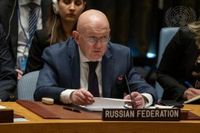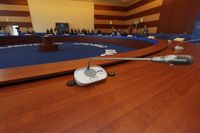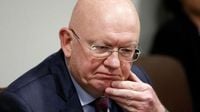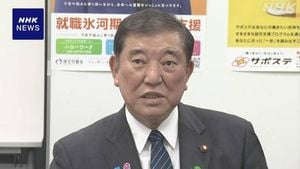On April 18, 2025, Vasily Nebenzya, Russia's Permanent Representative to the United Nations, addressed the ongoing conflict in Ukraine, declaring that a ceasefire is currently unrealistic due to the actions of the Kiev regime. Speaking to journalists following closed consultations at the UN Security Council, Nebenzya emphasized that Ukraine's non-compliance with a moratorium on strikes against energy infrastructure has undermined any prospects for peace.
"In these circumstances, talking about a ceasefire is simply unrealistic at this stage," Nebenzya stated, highlighting the failure of a limited ceasefire attempt aimed at protecting energy facilities, which Ukraine did not adhere to. This situation, he argued, illustrates the difficulties in negotiating a broader ceasefire agreement.
The moratorium on attacks against infrastructure facilities was introduced on March 18, 2025, following negotiations between Russian and American delegations, and was set to last for 30 days. However, according to reports from the Russian Ministry of Defense, during this period, Ukrainian forces launched attacks on energy facilities across 15 regions of Russia, indicating a clear violation of the ceasefire terms.
Nebenzya described the recent consultations at the UN Security Council as the "strangest" he has experienced during his tenure, suggesting a lack of serious engagement from the international community regarding the ongoing conflict. He called on Western nations to exert pressure on Ukraine to comply with the agreements made, yet he noted that no substantial response has been forthcoming.
In light of the ongoing violence, Nebenzya pointed out that the introduction of a comprehensive ceasefire across the entire front line remains unattainable. He referred to the insistence of former U.S. President Donald Trump on establishing a ceasefire, stating that the current conditions are not conducive to such measures, primarily due to the actions of the Kiev regime.
"Despite all the statements, the Ukrainian side constantly violated the moratorium, not intending to fulfill it. The same will happen with the negotiations," he warned, indicating that the Kremlin does not believe in the sincerity of Ukraine's commitment to peace.
Moreover, Nebenzya reiterated that Russia had adhered to the terms of the energy truce from its inception. He cited the proposal from Washington and Kiev for a 30-day truce, which Russia initially rejected but later agreed to the U.S. suggestion of refraining from strikes on energy infrastructure. However, he noted that there were immediate violations, including drone attacks on energy facilities in Donbass on the same day the moratorium was announced.
As tensions continue to escalate, the Kremlin's stance remains firm. Nebenzya's comments underscore the complexities of achieving peace in Ukraine, particularly in light of the ongoing hostilities and mutual accusations of violations. The international community's role in mediating the conflict appears to be diminishing, as calls for a ceasefire grow increasingly fraught with skepticism.
On the diplomatic front, Nebenzya's remarks come amid ongoing discussions between U.S. officials and European leaders regarding the situation in Ukraine. Following a recent meeting in Paris, where U.S. Secretary of State Marco Rubio engaged with EU representatives, the Kremlin is anticipating a definitive response from Washington regarding the ceasefire proposal. However, the outlook remains grim as both sides prepare for continued confrontation.
In summary, the situation in Ukraine remains precarious, with Nebenzya's statements reflecting a deepening divide between Russia and Ukraine. The lack of adherence to ceasefire agreements and the ongoing violence paint a bleak picture for any immediate resolution to the conflict.









